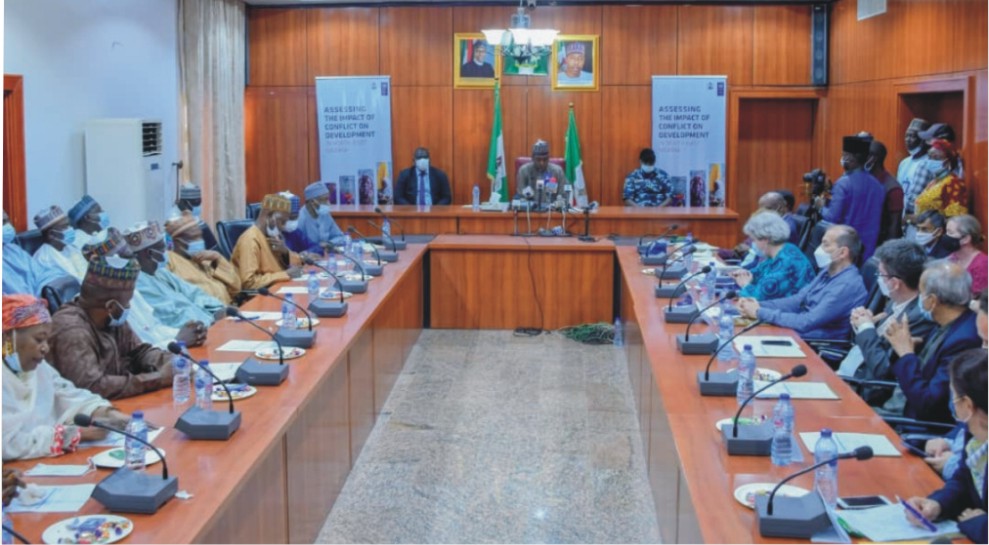Business
Food Security: Expert Harps On Improved Cassava Processing
A prominent agricultural economist and researcher, Dr. Adekunle Stephen Toromade, has stated that modern cassava processing would enhance food security and elevate Nigeria to greater economic heights.
Toromade emphasised the need to address occupational hazards and economic challenges faced by cassava processors to improve productivity and tackle global food security issues.
He explained that the cassava processing industry is plagued by occupational hazards that severely affect the health and economic well-being of processors, contributing to widespread poverty.
He stressed that addressing these hazards and challenges is crucial for enhancing productivity and sustainability.
“Cassava processing is crucial for many rural communities in Nigeria, involving tasks such as peeling, grating, fermenting, and drying to produce essential food products like garri, fufu, and tapioca.
“Despite its importance in the agricultural value chain, the industry is burdened by occupational hazards that severely affect the health and economic well-being of processors, contributing to widespread poverty”, Toromade said.
While discussing a comprehensive study to examine these challenges, Toromade noted that his research focused on the difficulties faced by cassava processors in three local government areas known for their high cassava production.
“Food security in Nigeria continues to deteriorate. Studies like this provide valuable insights into how improving conditions for food processors can help tackle food insecurity.
“One of the most striking findings of the study is that cassava processing is predominantly carried out by women. Many of these women, who are the primary breadwinners for their families, face numerous occupational hazards that exacerbate their poverty status.
“The study revealed that 46% of cassava processors are moderately poor, with a significant portion—about 69%—of their income spent on medical treatment and other family expenses, further deepening their poverty.
“Additionally, smoke inhalation during cassava processing ranked as the most prevalent occupational hazard for the processors.
“Studies have shown that smoke inhalation can severely impact both the health and productivity of processors. Chronic exposure to smoke can lead to respiratory issues and other serious health conditions, diminishing workers’ efficiency and livelihoods.
“This health decline results in high medical expenses, further straining the already limited financial resources of these processors. Factors such as larger household sizes and other health issues related to occupational injuries exacerbate their poverty”, Toromade added.
In addition to this technological advancement, Toromade emphasized the pressing need for extensive training programs to educate cassava processors on occupational safety.
Strengthening extension services to offer regular training on best practices and safety precautions can greatly improve workers’ health and productivity.
He said Government and NGO interventions are essential to make automated food processing machines more affordable, as well as providing subsidies to make protective gear more accessible.
Enhancing healthcare access to provide timely treatment for occupational injuries is also crucial for ensuring the well-being of these workers.
In his study, Toromade utilized blockchain, AI, IoT, and big data for real-time monitoring of critical parameters such as temperature, humidity, and location in agricultural systems.
This approach enhanced food supply chain management and optimised conditions in the food supply chain, particularly in cassava processing, reducing both waste and energy loss.
Toromade’s work has significantly contributed to improving the quality of life for cassava processors and potentially reducing their economic losses from excessive medical expenses.
Beyond addressing occupational hazards, implementing these recommendations to protect this essential workforce can significantly contribute to poverty alleviation in rural areas and enhance the economic prosperity of cassava processors.
Business
Debt Servicing Hindering Nigeria’s Dev – IMF

The International Monetary Fund (IMF) has opened up on Nigeria’s socio/economic development issues, saying that the country allocates the majority of its revenue to debt servicing, leaving limited funds for critical development projects.
Disclosing this while speaking during the Fiscal Monitor press briefing at the IMF/World Bank Annual Meetings in Washington DC, David Furceri, Division Chief of the IMF’s Fiscal Affairs Department, emphasised the need for Nigeria to adopt more effective revenue mobilisation strategies to ease this financial burden.
Furceri noted that Nigeria’s debt service-to-revenue ratio stands at around 60 per cent, significantly constraining the government’s ability to invest in social and economic programmes.
Although the debt service-to-GDP ratio has declined from nearly 100 per cent to 60 per cent, he stressed that the country must further reduce the share of its revenue allocated to debt repayments by focusing on broadening its tax base.
He said, “There is a need to grow the revenue-to-GDP ratio. For a country Like Nigeria, the Debt Service-to-Revenue is about 60 per cent. What that means is that a larger part of the revenue of the country goes into debt servicing.
“What we recommend for countries like Nigeria, if they can improve their revenue mobilisation, they will be able to reduce the portion of the revenue that goes into debt servicing.
“It is important to broaden the tax base in order to have more revenue and especially in Nigeria to put in place a system and mechanism that is transparent and efficient to assist the government in collecting more revenue”.
He called for the implementation of a transparent and efficient tax collection system, urging the government to improve its fiscal operations to generate more income.
Also, the IMF’s Fiscal Monitor Report released last Thursday highlighted projections that Nigeria’s debt-to-GDP ratio, currently at 50.7 per cent, is expected to drop to 49.6 per cent by 2025.
It noted that the country’s public debt includes overdrafts from the Central Bank of Nigeria and liabilities from the Asset Management Corporation of Nigeria.
“The overdrafts and government deposits at the Central Bank of Nigeria almost cancel each other out, and the Asset Management Corporation of Nigeria debt is roughly halved”, the report noted.
Business
SON To Simplify SMEs Certification Process

The Standards Organisation of Nigeria (SON) has revealed plans to support Small and Medium Enterprises (SMEs) across the country by simplifying access to certification and standards, in line with global best practices.
According to the agency, its initiative at the forefront of this drive is the Mandatory Conformity Assessment Programme, designed to assist local manufacturers in maintaining quality and safety standards, a key requirement for gaining consumer trust and penetrating international markets.
Acting Regional Director for SON in Lagos, Theresa Ojomo, disclosed this during the annual Walk for Standards event held in Lagos to mark World Standards Day.
She stated SON’s role in facilitating the growth of small businesses through programmes tailored to their needs.
“We have brought it down to the very small micro-organisations, encouraging them that they can imbibe standards”, she said.
She noted that businesses operating with minimal infrastructure could ensure quality in their production processes with SON’s support.
Ojomo explained that SON had made the process of adhering to standards more affordable and less burdensome for SMEs.
“We have brought in schemes that are very low in the economy because they always complained that it’s costly to have standards and quality.
“SON conducts only one inspection per year for micro-enterprises to ease the compliance process. The government and SON are ensuring that as small as the unit is, you can imbibe standards”, she remarked.
The Head of Codex, Nutrition and Tobacco Monitoring at SON, Yunusa Mohammed, reiterated that the organisation was committed to ensuring that consumers get value for their money by enforcing quality and safety standards.
“The ultimate aim for developing standards is to ensure quality and safety. Without testing the product to the requirements of the product standard, there is no way you can give that assurance”, he said.
Mohammed noted that SON had invested in state-of-the-art laboratories across the country to further support SMEs by offering testing services that help small businesses certify their products for both local and international markets.
Business
Group Partners Police Against Piracy In Nigeria’s Waterways
Active Marine Surveillance Coast Guard limited, a private security agency, has stated its preparedness to assist the police and other security agencies to check piracy along the nation’s waterways.
Director General of the Security outfit, Commander Godwin Amare, said this during the passing out parade of over 150 members of the Coast Guard in Port Harcourt.
He said apart from checking piracy, Active Marine Surveillance Coast Guard limited also provides security at jetties across the state and check pollution along the waterways, as well as mount security surveillance across the country.
Amare, however, said his security outfit needs the support of the state and federal governments in the discharge of its functions..
He said with government support, the problem of insecurity will be reduced in the states.
Amare also stressed the need for the government to engage the outfit in the provision of security in the state, adding that by doing so, government will also be creating employment opportunities for the people.
According to him, it’s men can also be engaged in the provision of security at strategic locations across the state.
He used the occasion to commend the Deputy Director General of the outfit, Captain Dain Elekima Joyfull, as well as Captain Emberra Michael Niyikpen, and Pastor Anthony Afakwa, for their support.
Speaking, the Rivers State Commissioner of Police, Cp Mustafa Bala, who was represented at the occasion by SP Luka, urged the newly passed out officers of the Civilian joint taskforce and Active Marine Coast Guard limited to be professional in the conduct of their duties.
He also pledged to provide them with the necessary support.
Also speaking, the Rivers State Commandant of the Civilian Joint Taskforce, Commander Richard Akpobari, said his group is prepared to support the security agencies to curb criminalities in the state.
According to him, the situation aims to reduce the burden of providing security in the state.
By: John Bibor
-
News2 days ago
NDLEA Intercepts N4.3bn Worth Of Opioids At Onne, Tincan Ports
-

 Business2 days ago
Business2 days agoMarketers Threaten Boycott Of PH Refinery
-
Politics9 hours ago
Abbas Advocates Skills Dev To Tackle Youth Unemployment
-

 News4 hours ago
News4 hours agoReps Give FG 72 Hours To Unfreeze NSIPA’s Accounts
-

 Education2 days ago
Education2 days agoCorruption In Governance: Don Advocates Traditional Values Promotion
-

 News2 days ago
News2 days agoCBN Launches Redesigned Website
-
Business8 hours ago
UK Clarifies Denying Air Peace Heathrow Airport Slots
-
Sports3 hours ago
Team Rivers Shine At South-East Chess Championship

